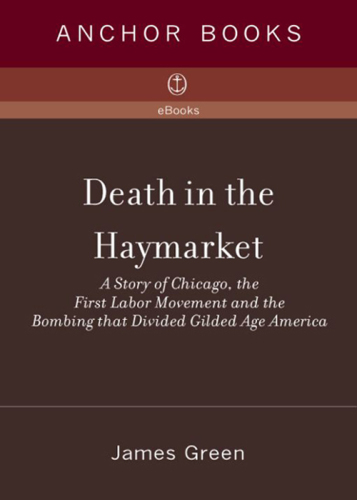
Death in the Haymarket
A Story of Chicago, the First Labor Movement and the Bombing that Divided Gilded Age America
کتاب های مرتبط
- اطلاعات
- نقد و بررسی
- دیدگاه کاربران
نقد و بررسی

December 19, 2005
As Green thoroughly documents, the bloody Haymarket riot of May 4, 1886, changed the history of American labor and created a panic among Americans about (often foreign-born) "radicals and reformers" and union activists. The Haymarket demonstration, to protest police brutality during labor unrest in Chicago, remained peaceful until police moved in, whereupon a bomb was thrown by an individual never positively identified, killing seven policemen and wounding 60 others. Shortly after, labor leaders August Spies and Albert Parsons, along with six more alleged anarchists, stood convicted of murder on sparse evidence. Four of them went to the gallows in 1887; another committed suicide. The surviving three received pardons in 1893. The Knights of Labor, at that time America's largest and most energetic union, received the blame for the riot, despite a lack of conclusive evidence , and many Knights locals migrated to the less radical American Federation of Labor. Labor historian Green (Taking History to Heart
) eloquently chronicles all this, producing what will surely be the definitive word on the Haymarket affair for this generation. Green is particularly strong in documenting the episode's long aftermath, especially the decades-long efforts of the white Parsons's black wife to exonerate her husband. B&w illus.

April 1, 2006
Green (history, Univ. of Massachusetts; " Taking History to Heart: The Power of the Past in Building Social Movements") writes of the post -Civil War labor agitation in Chicago that culminated in the May 1886 Haymarket Square riot, when an incendiary device tossed by a still-unidentified individual caused police to open fire and led to the death of several people, including eight policemen. The bombing fueled criticism of the dissenting press by the powers that be in a class-divided polity and produced a rallying cry for the labor movement, which was seeking, among other things, an eight-hour workday. Eight mostly foreign-born anarchists were convicted of the crime, because of their speeches and writings. Four of them were hanged, one -s sentence was commuted, and three were famously pardoned by Gov. John Peter Altgeld because of lack of evidence. Green tells readers little that is new, instead mining printed sources and offering the accepted and only logical interpretation of the conspiracy-driven trial as a miscarriage of justice. He states that -the memory of the Haymarket anarchists [has] endured - as a tale about labor folk heroes, so he does not bring these figures to life. Recommended for labor history collections that would benefit from a recent monograph on this seminal event and for those seeking to expand their holdings in Chicago studies." -Frederick J. Augustyn Jr., Library of Congress"
Copyright 2006 Library Journal, LLC Used with permission.

February 1, 2006
Green, an academic, offers a narrative history of Chicago's Haymarket bombing in 1886, the infamous trial that followed, and the hanging of subsequently determined innocent men. Chicago was then at the heart of the labor struggle for the eight-hour day, and we learn that "workers' struggles had often been met with shocking repression, and that when violence bred violence, when powerless laboring people struck back in anger, they often paid with their lives." The Haymarket episode became a seminal moment for the American labor movement, and Green takes us inside the personal, social, and cultural elements of this tragic event. Evaluation of Haymarket includes the contention that a conservative bias against radicals, labor organizers, immigrants, and minorities was fundamental to the conflict as well as the view that execution of the anarchists saved the country from anarchy and was a moral and political victory for law and order. The author notes that after Haymarket, social peace among the various classes in Chicago was impossible, and grudges continued for decades.(Reprinted with permission of Booklist, copyright 2006, American Library Association.)

























دیدگاه کاربران